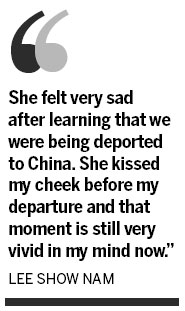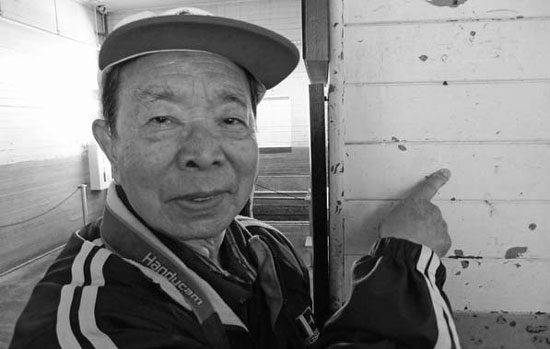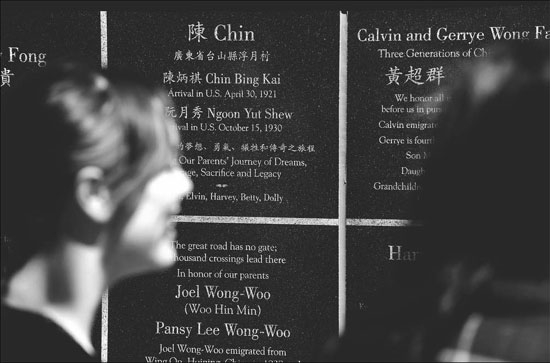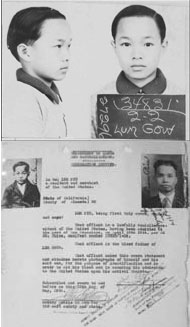An island's painful legacy
Updated: 2012-10-19 11:43
By Chen Jia (China Daily)
|
||||||||
|
Lee Show Nam spent 18 months in detention on Angel Island, held by US immigration authorities as a "paper son" and barred from entering the country until he was 42 years old. Provided to China Daily |
US laws to curb Chinese immigration split families and delayed a reunion between Lee Show Nam, who was detained as a teenager, China Daily's Chen Jia reports from San Francisco.
On Feb 5, 1935, seasick from a 3½-week voyage from China aboard the steamship President Taft, teenager Lee Show Nam and his mother docked at a San Francisco pier.
They had come to join Lee's father, Lum Bew, who ran a poultry shop across the bay in Oakland's Chinatown neighborhood.
The father-son meeting, however, would have to wait 28 years.
Related reading: Son of detainee designs closure for once-shunned US immigrants
Lee, who was 14 at the time, and his mother, Ow Soak Yong, were held at Angel Island, an immigration processing and detention facility surrounded by the Pacific Ocean. They would remain there for 18 months, fighting a legal battle to prove they were in fact the wife and son of the Chinese merchant.
"I was told to tell everyone my name was Lum Ngow, but that wasn't my real name. I became a 'paper son'," Lee said, using a term to describe young Chinese men of the time who tried to immigrate by claiming - sometimes falsely - to be related to a US citizen.
|
Angel Island's Immigration Heritage Wall, which was completed in early October, lists the names of immigrants who passed through the Northern California facility. China News Service |
Lee, who is now 91, told China Daily in an interview in his Oakland apartment that most would-be immigrants from China used fake names and bogus documents to get around the strictures of the Chinese Exclusion Act of 1882. That law, which wasn't repealed until 1943, barred Chinese from lawful immigration or gaining US citizenship. Exceptions were made only for merchants, students, diplomats and the sons of citizens.
As relayed in an article published on the website of the Angel Island Immigration Station Foundation, the immigration history of Lee's family exemplifies the various traps set for Chinese trying to enter the US.
|
Lee, pictured here in documents and photographs from childhood, was finally admitted entry to the US in 1963. Provided to China Daily |
A sister-in-law and brother - Lee's aunt and uncle - had come to the US in 1921, seven years after Lum Bew immigrated, through Angel Island, which at that time served as a West Coast version of New York's Ellis Island. Seeking to avoid detailed questions from immigration officers that could trip them up, the couple claimed their relative in the US was single. In fact he had married the previous year, 1920, during a visit to China and said so when asked about his marital status upon re-entering the US, adding that he would be sponsoring his wife and son's immigration.
The discrepancy was noted by the US officers but not disclosed to Lum Bew: He didn't know his sister had lied.
The aunt later recanted, saying she had attended Lum Bew's wedding in China before she and her husband left for the United States but that he pressured her to withhold that information from immigration officers due to a family quarrel over money.
Lee and his parents were questioned over four days regarding family relationships and life back in China. Their answers to 808 questions, according to the Angel Island Immigration Station Foundation website, were compared against testimony from six relatives who had immigrated earlier.
The contradictory stories, and the inconsistent paperwork that came with them, provided the basis for Lee and his mother to be denied entry to the US. They would end up detained at the same California immigration station their loved ones had passed through.
"Bribery was very common at that time," Lee told China Daily. "We could definitely have given $500 to the officers and they would have let us into the US. But my father insisted that because we were telling the truth, it wasn't necessary to pay such a huge sum of money."
"You could buy a brand new Cadillac" for about $350, he said. "It was more than enough. Back then, six oranges cost only 10 cents."
Lee's father's refusal to fork over a bribe left the family the option of challenging in court the detention of his wife and son. After 18 months, including a trial, the denial was upheld. Lee Show Nam and Ow Soak Yong were deported to China. It was 1936.

During his year and a half on Angel Island, Lee was allowed to see his father just three times, with each visit limited to an hour.
"Dad was allowed to bring us some food, like barbecued chicken. It was a delicious feast as the daily menu on Angel Island was cucumbers, pickled olives, bean curd -things like that," he recalled. "If I had 5 cents, I would buy a soda from Henry, an Italian who ran the concession stand. He also sold us paper, envelopes, pencils and toothpaste."
It wasn't until 1958 that his mother was able to return to the US for immigration, and Lee followed five years later. The legal path was cleared with his father's admission that he had immigrated in 1914 as a "paper son", though he hadn't meant to evade authorities' evaluation, and the man took back his real surname - Lee. By then, the former Lum Bew had fathered three other children.
In 1963, 20 years had passed since the exclusion law's repeal by Congress (China was a World War II ally of the US), President John F Kenney relaxed immigration rules and the former detainee returned to Northern California - by airplane. He settled in Oakland and began working at his father's deli, retiring in 1980.
But the hard times that preceded his entry to the US are etched in his memory.
"I still remember my mother's tears when we were being deported," he said.
The immigrant-processing center, which operated from 1910 to 1940, was on the northeast corner of Angel Island. Detainees - those who had been turned away by immigration officers but for various reasons not deported - were barred from leaving the compound and their outgoing mail was monitored.
Chinese detainees - numbering over 100 when Lee and his mother were there - had their own dormitory; Indians, Japanese and Mexicans lived in others. At 5 am, a loudspeaker blaring radio announcements was the detainees' wake-up call. At 6, doors were opened and the Chinese went down a covered stairway to the dining room for breakfast. Lunch, usually bread and jam with coffee or tea, followed at 10 am. Dinner was at 3 pm.
Eighteen months of isolation wasn't always bad for the teenage Lee, who made lots of friends on the island. They played table tennis and dominoes, read newspapers and listened to records.
Someone showed Lee how to play the erhu, a traditional Chinese stringed instrument, and another detainee, a pilot, taught him the English alphabet and a few simple words.
An elderly woman named Missy Rose was also kind to Lee and his mother, he recalled.
"She felt very sad after learning that we were being deported to China. She kissed my cheek before my departure and that moment is still very vivid in my mind now."
Contact the reporter at chenjia@chinadailyusa.com

 Relief reaches isolated village
Relief reaches isolated village
 Rainfall poses new threats to quake-hit region
Rainfall poses new threats to quake-hit region
 Funerals begin for Boston bombing victims
Funerals begin for Boston bombing victims
 Quake takeaway from China's Air Force
Quake takeaway from China's Air Force
 Obama celebrates young inventors at science fair
Obama celebrates young inventors at science fair
 Earth Day marked around the world
Earth Day marked around the world
 Volunteer team helping students find sense of normalcy
Volunteer team helping students find sense of normalcy
 Ethnic groups quick to join rescue efforts
Ethnic groups quick to join rescue efforts
Most Viewed
Editor's Picks

|

|

|

|

|

|
Today's Top News
Health new priority for quake zone
Xi meets US top military officer
Japan's boats driven out of Diaoyu
China mulls online shopping legislation
Bird flu death toll rises to 22
Putin appoints new ambassador to China
Japanese ships blocked from Diaoyu Islands
Inspired by Guan, more Chinese pick up golf
US Weekly

|

|









